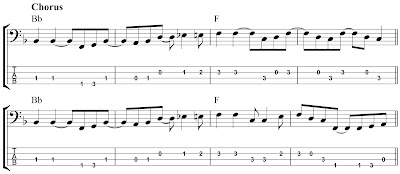(Turner/Glover)
From the Joe Cocker album Mad Dogs and Englishmen
In “Sticks and Stones” Radle lays down another solid gospel/R&B groove. His bass line on the verses is fairly improvisational. He plays similar things in each of the verses, but we never hear exactly the same line twice.
On the choruses, the rest of the band plays frantically and a bit chaotically (in a very good way!), but Radle’s bass line becomes a bit more regular. In this way, he holds the band together and keeps the song from running off the rails entirely. As the band vamps on the chorus at the end of the song, Radle plays the same pattern for almost every Bb chord. On the F chord, he has two basic patterns that he alternates between. Both are given below.
A full transcription is below.



















